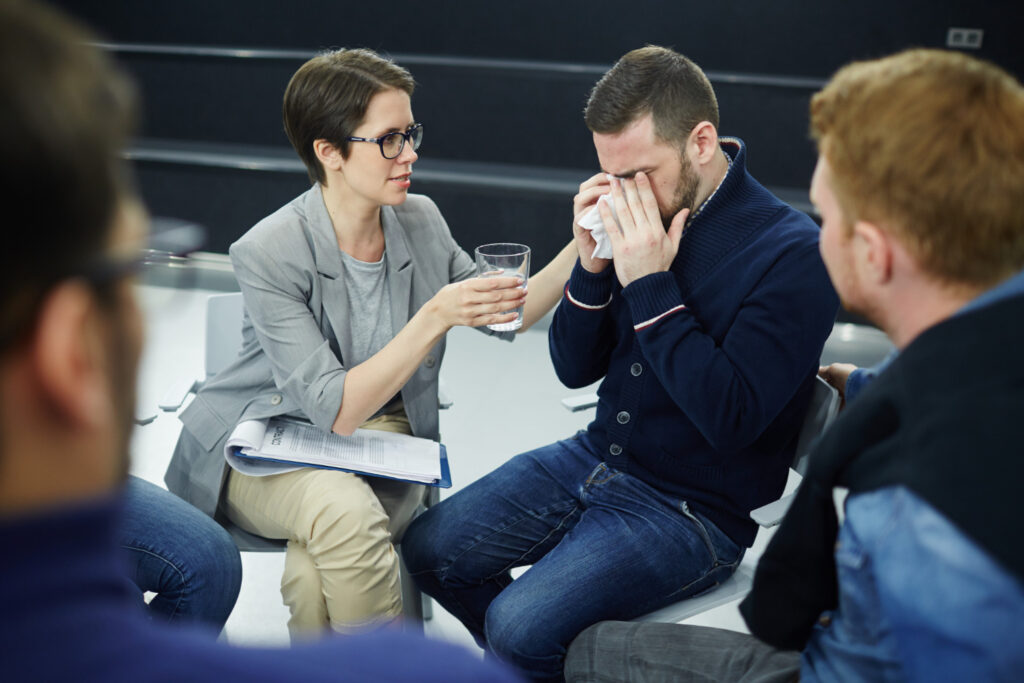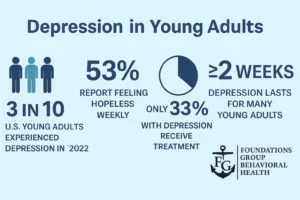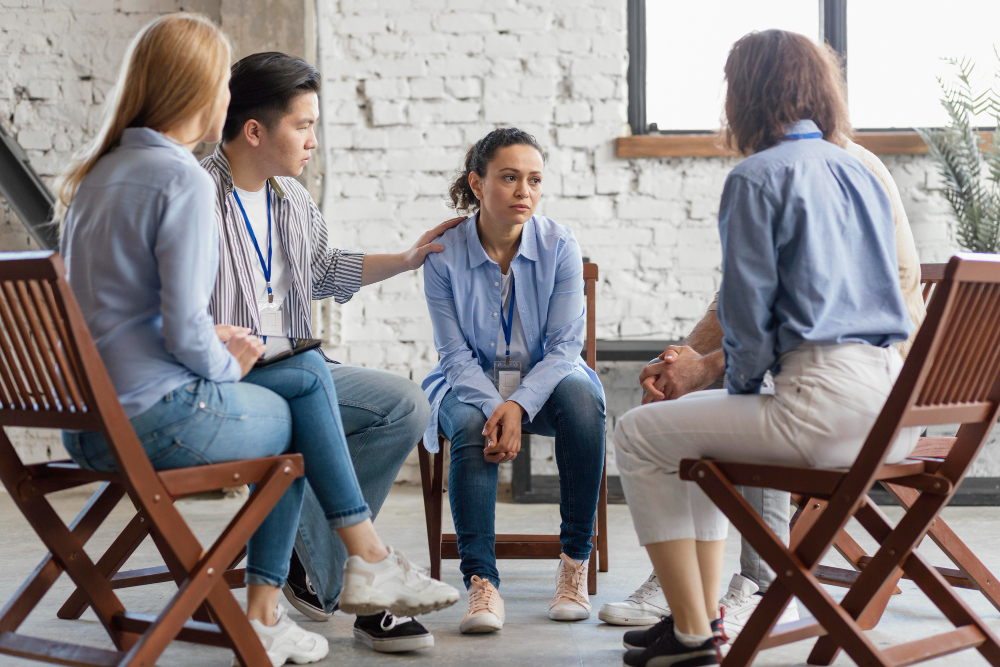Everyone else is at the bar. Or they’re filming another blurry story, throwing up a peace sign you know isn’t real peace. Maybe it used to be you. Or maybe it never was. Either way, you’re not there now—and if you’re reading this, you might be wondering if that means something’s wrong with you.
Here’s the truth: choosing treatment for depression in your teens or 20s doesn’t make you weak. It doesn’t mean you’re broken. It might just mean you’re brave enough to stop pretending everything’s fine when it isn’t.
Depression doesn’t wait until your 30s to show up. It doesn’t care if you’re at college, in your first job, or trying to figure out what kind of person you want to be. And when everyone else is still partying, depressive disorder can feel like a silent weight pulling you out of sync.
But treatment? Treatment can shift the rhythm. It can reconnect you to yourself, even when everyone else is dancing to a beat you can’t hear.
If you’re wondering whether you need help, Depressive Disorder Treatment through Foundations Group in Cape Cod, MA, might be what finally makes life feel manageable again.
Here are eight very real, very human reasons why treatment might be the right move—even when it feels like no one else gets it.
1. You’re Not Lazy—You’re in Shutdown Mode
If your brain feels like it’s running in slow motion while everyone else is sprinting, you’re not failing. You’re surviving. Depression doesn’t just make you “sad.” It can make your body ache, your thoughts slow, your energy vanish.
This isn’t about willpower. This is about biology. And treatment is where you learn how to work with your brain instead of constantly fighting it.
2. Partying Through It Isn’t a Cure—It’s a Delay
There’s a kind of loneliness that hits after a night out. You know the one. It’s 2 a.m., you’re lying in bed, and all the noise is gone—but the sadness is still there.
Treatment won’t promise instant joy. But it will offer actual tools, support, and space to figure out why that ache keeps coming back, no matter how many distractions you throw at it.
3. Real Connection Starts With Real Words
Depression can make even basic feelings hard to explain. You might say “I’m tired” when what you mean is “I feel invisible.” Or “I’m fine” when you’re actually falling apart.
In treatment, especially with therapists who specialize in depressive disorders, you get help translating the emotional fog. And once you have words for what you’re feeling, everything starts to shift.
4. You’re Not the Only One Skipping the Party
Maybe it feels like you’re the only one saying no to the club, the drinks, the hookup culture. But more people are walking away than you think. They’re just quieter about it.
Whether you’re in Barnstable, Hyannis, or looking for Depressive Disorder Treatment in Barnstable County, know this: there are others choosing therapy over Thursday shots. They’re just not hashtagging it.
5. Depression Isn’t a Phase—And You Don’t Have to Wait to Get Help
One of the biggest lies about mental health is that you’re “too young” to be this sad. Or that “everyone feels this way” in their twenties.
Some sadness is normal. But if it doesn’t lift—or if it’s turning your days gray and your nights restless—you don’t have to just ride it out. Treatment now can change the course of your next decade.
6. Therapy Doesn’t Mean You’re Broken—It Means You’re Brave
Getting help doesn’t mean you’ve failed. It means you’re human—and honest enough to admit when things hurt.
At Foundations Group Behavioral Health, our team sees that kind of courage every day. Whether you’re starting therapy for the first time or returning after a tough season, we’ll meet you exactly where you are—without judgment, without pressure.
7. You Can Learn to Like Who You Are (Sober, Sad, and Everything In-Between)
It’s weird, but depression can mess with your identity. You might start believing you’re only fun when you’re drinking. Or only loveable when you’re faking happiness.
But in therapy, you get to meet the version of you that isn’t pretending. And over time, that version becomes someone you actually like.
8. Feeling Like the “Weird One” Is a Sign You’re Awake—Not Alone
If you feel out of sync with your peers, that might mean you’re noticing things they haven’t faced yet. That kind of self-awareness isn’t a burden—it’s a signal. One that says: You’re ready for more. You’re ready for healing.
And you don’t have to go it alone. Depressive Disorder Treatment in Falmouth, MA is available for people like you—people who feel like outsiders, but are actually ahead of the curve.
What Young Adults Say About Starting Treatment
“I thought I’d be the youngest person there. I wasn’t. I thought I’d feel awkward. I did. But I also felt seen—for the first time in months.”
– Client, Age 23
“Getting help for my depression didn’t make me boring. It made me real. That’s when I started attracting the kind of people who actually cared.”
– Client, Age 25
Frequently Asked Questions
What does Depressive Disorder Treatment actually involve?
Treatment usually includes therapy (individual or group), coping skills training, and sometimes medication support. At Foundations Group Behavioral Health, we tailor every plan to what works for you. No one-size-fits-all approach here.
Do I have to be suicidal to get treatment?
No. Many people seek help for depressive disorder without ever having suicidal thoughts. If you’re struggling with sadness, isolation, low energy, or disinterest in life—you’re not overreacting. You’re being proactive.
How do I know if it’s depression or just a rough patch?
Everyone has bad days. But if you’re feeling low more days than not for two weeks or more—and it’s affecting your sleep, appetite, motivation, or relationships—it might be time to consider professional support.
What if I start treatment and still feel like the “weird one”?
That’s valid. It takes time for your social life to catch up with your emotional growth. But here’s the kicker: the more you invest in healing, the more your people find you. And they’re usually nothing like the ones you thought you needed.
Is there treatment near me?
Yes. If you’re in Cape Cod, Depressive Disorder Treatment in Barnstable County and Falmouth is available through Foundations Group Behavioral Health. Our programs are designed for young adults like you—navigating mental health in a world that doesn’t always get it.
Ready to Feel More Like Yourself?
It’s okay to feel out of place. It’s okay to be young and tired. But you don’t have to stay stuck there.
Call 888-685-9730 or visit our Depressive Disorder Treatment program in Cape Cod, MA to explore more.









